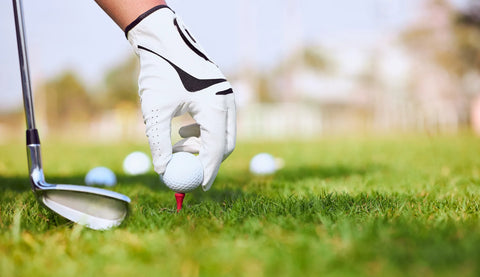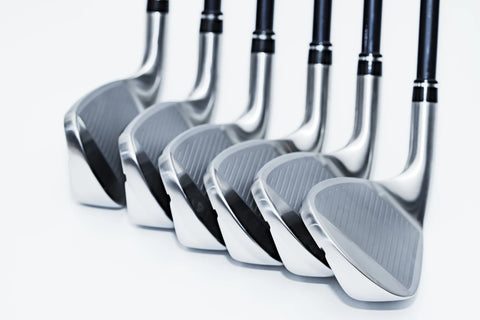So, you’ve taken up golf? – Welcome to the team! It’s a fun and challenging sport that gets you outside with the added satisfaction of hitting the perfect score. The first few rounds of golf and selecting the ideal golf clubs can see you making some big decisions that will ultimately affect your game and your passion for continuing to play (even on those hard days). Choosing the best golf irons (the go-to clubs on the course) will also feature, but with lines of gaming clubs, where do you begin? Don’t worry; with this guide, we’ll give you the information you need to get started.
Ironing Out the Basics: Cavity Back vs. Muscle Back
There are two main types of irons: cavity and muscle back. The differences lie in the design of the clubhead.
Cavity-back golf irons have a large, hollow section behind the face; they are the favoured choice among beginners. The design caters to a more prominent ‘sweet spot’—an area of the clubface that delivers not only a powerful shot but an accurate one. So even if a player ever so slightly mishits the ball, it will still cover a reasonable distance over the course, thus making them more forgiving for players who are new to developing their swing.
On the other hand, we have muscle back golf irons, which feature a smaller head and sweet sport. They deliver a superior feel and control for skilled golfers and are less forgiving on those off-centre hits.
It’s recommended that until you have developed your swing and feel confident in reaching for a more demanding muscle back iron, you stick with a cavity back iron.
Game Improvement vs. Player’s Irons
There is another distinction to think about, that’s between game improvement irons and player’s irons. As the name suggests, game improvement irons are to make the game easier. They generally feature larger clubheads, stronger lofts, and wider soles. They also include the ability to produce higher launch angles, meaning the golf balls’ ability to become airborne is easier, and there is more chance of launch and distance upon off-centre hits. For newbie golfers still working on hitting the ball consistently, this is the ideal club choice for you.
Then you have players’ irons dedicated to the more experienced golfer. A sleeker profile, narrow soles, and smaller head mean the player has increased control over shaping shots and trajectory, all while allowing skilled golfers to work the golf ball with precision. These elements mean they offer lower launch angles for players still honing their ball contact skills.
Golf 360’s Top Golf Irons
Depending on skill level…
- Intermediate: Titleist T200
- Pro: Titleist T100
Finding the Right Iron Set for You
Now that you understand the differences between golf irons, it’s time to find the right golf club for your skill level and swing.
Here are some pointers…
- Swing speed: How fast you swing the club matters. Naturally, a beginner’s swing is slower. Choosing irons with lightweight shafts, preferably graphite, will allow newcomers to the game to develop increased clubhead speed and improve the distance the ball covers.
- Height: Shorter players may need slightly shorter shafts, whereas taller golfers may benefit from playing with longer shafted irons. This is all down to delivering proper swing mechanics.
- Handicap: The measure of your ability (handicap) is probably higher. Look for golf irons designed to improve your game, with more prominent sweet spots and wider soles.
- Budget: The price of golf clubs can vary dramatically based on brand, technology and materials. Set a realistic budget and prioritise features that align with your skill level.
The correct set of irons can make or break your game. So, picking the proper golf set for your swing style and skill level will make all the difference.
Don’t Get Lost in the Specs: Get Fitted
Understanding the various types and features of irons is important, but the best approach is to get fitted for your golf clubs, including your irons.
A fitting will take into account your swing mechanics, body measurements, and swing speed to deliver a unique recommendation of irons with the optimal shaft length, flex (stiffness), and lie angle (the angle the clubface sits at).
Getting fitted is a worthwhile investment, regardless of whether you are a newcomer or a seasoned professional. After all, nobody wants to spend their days hacking away at the green and seeing no impressive scores.
Tips for Newcomers
- Exploring your options: As a new golfer, you may only need a complete set of irons (typically 4-PW). Many starter sets include a hybrid club or two and a mix of wood and irons. Hybrids deliver more forgiveness on longer approach shots, making them a great choice until you develop your swing and feel ready to use the longer irons.
- Grips: Old or poorly fitted grips can seriously affect your swing. Go for comfortable, high-quality grips that provide a secure feel.
- Try before you buy: Test out different iron sets before you buy. Many golf shops have demo clubs available, giving you a chance to experience the weight, grip size, and general feel of the irons to see which ones work best for your swing style.
- Lessons: Proper swing technique is integral to improving your game. Consider signing up for a few lessons with a qualified golf instructor who can help you develop a solid foundation and boost your confidence on the golf course.

Golf Iron FAQ
Q: Should I prioritise distance or accuracy when choosing irons?
A: As a beginner, focus on accuracy first.
Q: What’s the deal with iron numbers? (e.g., 4-iron, 9-iron)
A: Lower iron numbers (4-iron) are longer irons used for farther shots, while higher numbers (8-iron, 9-iron) are shorter irons for more precise approach shots.
Q: What’s the difference between loft and lie angle in irons?
A: Loft affects how high the ball goes, while lie angle impacts how the clubface sits at address.
Q: As a beginner should I worry about buying expensive irons?
A: Focus on features that cater to your skill level (forgiveness, ease of launch) rather than top-of-the-line brands when starting out.
Q: What’s the most important factor in choosing irons?
A: The most important factor is feeling comfortable and confident with the irons. Try out different sets and choose the ones that inspire you to play your best!

Take the Guesswork Out of Finding the Best Golf Irons
Picking out the best irons is essential to getting the most out of every round of golf. Golf 360’s team of experts can guide you through the different iron types, help you understand the features that suit your swing, and answer any questions you might have. Don’t settle for “good enough.” Visit Golf 360 today!



